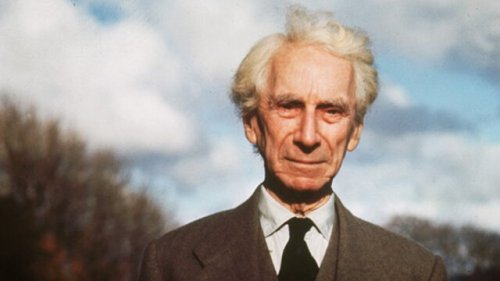Happiness According to Bertrand Russell

Bertrand Russell was an English philosopher, mathematician, and writer who won the Nobel Prize for Literature in 1950. At first, he might not seem like someone with the secret to happiness. In fact, he lived much of his life alternating between scarcity and abundance. But perhaps that is exactly why he was able to turn his life around and learn to be happy.
This controversial thinker had the misfortune of losing his parents when he was only 6 years old. After that, he lived with his very strict grandparents. From a very young age, he felt that life was almost unbearable. He later confessed that he thought about suicide on more than one occasion.
“The wise man thinks about his troubles only when there is some purpose in doing so; at other times he thinks about other things.”
-Bertrand Russell-
However, Bertrand Russell found that knowledge led him on a path to fulfillment. Philosophy and logic allowed him to go deeper into his own experience. It helped him feel part of something bigger, raise his spirits, and overcome his suffering. According to the particular philosopher, that is part of the hypothesis of how to be happy.
Happiness comes from focusing outward
Bertrand Russell believed that closing yourself off only leads to sadness and boredom. If we focus only on what is missing in our lives, on our problems, failures, and fears, we lose enthusiasm for life. In this aspect, he coincides with Eastern philosophers and Lacanian psychoanalysis. These two schools of thought believe that the “I” is a source of suffering and illness.

In return, if we focus our attention outward, life becomes simpler. These external aspects of life are made up of many different realities. Knowledge, other people, work, hobbies, etc. All of these things make life more interesting and full.
Bertrand Russell noted that a generous spirit brings delight and joy. And these, in turn, are sources of energy and motivation. They also provide strength when it comes time to solve your own problems.
“When my time comes to die, I will not feel that I have lived in vain. I have seen red sunsets, morning dew, and snow shining in the light of the universal sun. I will have smelled rain after a drought and heard the stormy Atlantic crash agains the granite coast of Cornwall”
-Bertrand Russell-
How to cultivate a generous spirit
A generous spirit doesn’t just appear out of nowhere. It is necessary to cultivate it. For B. Russell, keeping busy with everyday activities helps open the doors to happiness. It isn’t about turning our backs on introspection and self-reflection, however. That would result in a trivial life. Rather it is about trying to find balance, to find a place equidistant from those two extremes.

In this sense, it is also important to choose the right moment and the correct way. There is a time to think about yourself and a time to externally focus your thoughts. Think about your own problems when it makes sense to do so, and the rest of the time we can turn our attention out towards the world.
What Bertrand Russell proposes is to cultivate an organized mind. If we can achieve this, our minds will always be clearer and more focused on the present. When we think about ourselves, we should do it rationally and with maximum concentration. We also have to be capable of questioning our own reasoning to determine if it is valid or not.
“No one should believe himself to be perfect, nor worry too much if he is not.”
-Bertrand Russell-
Two virtues to cultivate
Bertrand Russell’s own life shows us something that he claimed later: happiness is a conquest. It doesn’t happen on its own, nor come from outside. The ability to be happy is exactly that: an ability. We have to work on it and cultivate it in order to achieve it. That’s why two virtues are essential in this process: effort and resignation.

Effort is the will to direct your energies towards the work necessary to achieve something you desire. It requires hard work and perseverance. Nothing that is worth anything is achieved from one day to the next. The same goes for being happy. That is why it is important to cultivate this attribute that allows you to direct your effort towards achieving your goals.
The other essential virtue for happiness, according to Russell, is resignation. It might more precise to talk about “acceptance.” Life gives us situations that are inevitable and impossible to solve. Some examples of that are death, incurable disease, or definitive loss.
We can’t undo these things. What we can do, however, is increase our ability to accept them. We shouldn’t waste time trying to solve them nor let them disturb us. Instead, we should write them into our story in a way that does us good.
Bertrand Russell was one of the most brilliant men of his time, and his ideas are still relevant today. He went from being an orphan, sad and lost in the world, to becoming one of the most important intellectuals in the world. His very life and achievements bear up the weight of his words.
Bertrand Russell was an English philosopher, mathematician, and writer who won the Nobel Prize for Literature in 1950. At first, he might not seem like someone with the secret to happiness. In fact, he lived much of his life alternating between scarcity and abundance. But perhaps that is exactly why he was able to turn his life around and learn to be happy.
This controversial thinker had the misfortune of losing his parents when he was only 6 years old. After that, he lived with his very strict grandparents. From a very young age, he felt that life was almost unbearable. He later confessed that he thought about suicide on more than one occasion.
“The wise man thinks about his troubles only when there is some purpose in doing so; at other times he thinks about other things.”
-Bertrand Russell-
However, Bertrand Russell found that knowledge led him on a path to fulfillment. Philosophy and logic allowed him to go deeper into his own experience. It helped him feel part of something bigger, raise his spirits, and overcome his suffering. According to the particular philosopher, that is part of the hypothesis of how to be happy.
Happiness comes from focusing outward
Bertrand Russell believed that closing yourself off only leads to sadness and boredom. If we focus only on what is missing in our lives, on our problems, failures, and fears, we lose enthusiasm for life. In this aspect, he coincides with Eastern philosophers and Lacanian psychoanalysis. These two schools of thought believe that the “I” is a source of suffering and illness.

In return, if we focus our attention outward, life becomes simpler. These external aspects of life are made up of many different realities. Knowledge, other people, work, hobbies, etc. All of these things make life more interesting and full.
Bertrand Russell noted that a generous spirit brings delight and joy. And these, in turn, are sources of energy and motivation. They also provide strength when it comes time to solve your own problems.
“When my time comes to die, I will not feel that I have lived in vain. I have seen red sunsets, morning dew, and snow shining in the light of the universal sun. I will have smelled rain after a drought and heard the stormy Atlantic crash agains the granite coast of Cornwall”
-Bertrand Russell-
How to cultivate a generous spirit
A generous spirit doesn’t just appear out of nowhere. It is necessary to cultivate it. For B. Russell, keeping busy with everyday activities helps open the doors to happiness. It isn’t about turning our backs on introspection and self-reflection, however. That would result in a trivial life. Rather it is about trying to find balance, to find a place equidistant from those two extremes.

In this sense, it is also important to choose the right moment and the correct way. There is a time to think about yourself and a time to externally focus your thoughts. Think about your own problems when it makes sense to do so, and the rest of the time we can turn our attention out towards the world.
What Bertrand Russell proposes is to cultivate an organized mind. If we can achieve this, our minds will always be clearer and more focused on the present. When we think about ourselves, we should do it rationally and with maximum concentration. We also have to be capable of questioning our own reasoning to determine if it is valid or not.
“No one should believe himself to be perfect, nor worry too much if he is not.”
-Bertrand Russell-
Two virtues to cultivate
Bertrand Russell’s own life shows us something that he claimed later: happiness is a conquest. It doesn’t happen on its own, nor come from outside. The ability to be happy is exactly that: an ability. We have to work on it and cultivate it in order to achieve it. That’s why two virtues are essential in this process: effort and resignation.

Effort is the will to direct your energies towards the work necessary to achieve something you desire. It requires hard work and perseverance. Nothing that is worth anything is achieved from one day to the next. The same goes for being happy. That is why it is important to cultivate this attribute that allows you to direct your effort towards achieving your goals.
The other essential virtue for happiness, according to Russell, is resignation. It might more precise to talk about “acceptance.” Life gives us situations that are inevitable and impossible to solve. Some examples of that are death, incurable disease, or definitive loss.
We can’t undo these things. What we can do, however, is increase our ability to accept them. We shouldn’t waste time trying to solve them nor let them disturb us. Instead, we should write them into our story in a way that does us good.
Bertrand Russell was one of the most brilliant men of his time, and his ideas are still relevant today. He went from being an orphan, sad and lost in the world, to becoming one of the most important intellectuals in the world. His very life and achievements bear up the weight of his words.
This text is provided for informational purposes only and does not replace consultation with a professional. If in doubt, consult your specialist.







